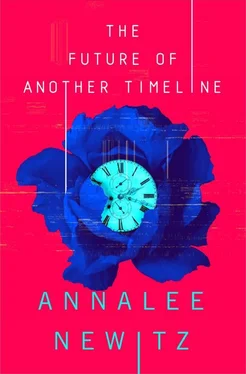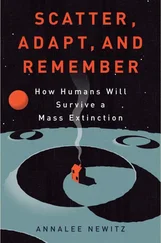When I arrived in early April 1893, I had ice cold mud in my leather shoes. There was no bank of networked computers. An engineer was feeding coal to a single, steam-powered tapper connected to a massive turbine that dominated the mining camp’s wood plank warehouse. The room smelled like smoke and machine oil.
I stood up unsteadily, taking in the rough walls, patched here and there with epoxy. Miners had stumbled on the Flin Flon Time Machine only fifteen years before, making it the most recently discovered of the five known Machines. That meant travelers who used Flin Flon to go back further than 1878 found themselves alone on a rocky outcropping next to a beautiful lake. No shack, no tappers, nothing. With training, a person could use stones to pound the Machine interface and return to their present. But I’d learned on tappers, so I generally used the Flin Flon machine only to explore the nineteenth and twentieth centuries. To go further, I took the Machines at Raqmu and Attirampakkam, discovered thousands of years ago. Using those, you could go back pretty far and find bureaucrats from long-dead regimes to greet you—along with people trained in the art of tapping by hand. I’d never used the other two Machines, at the Super Pit in Kalgoorlie, Australia, and Timbuktu in Mali. Unless there was a compelling reason to be in those places, grants typically covered booking in only the closest Machines.
Light came in from the doorway, and I could see my greeting committee now. A white man with an elaborately waxed moustache and dusty overcoat doffed his hat as he entered. He spoke with a faint Quebecois accent.
“When are you coming from?”
I showed him my tattoo. “A few decades upstream: 2022.”
“Welcome. How was the day up there?”
“I came in fall, so it was pretty chilly.”
He grinned and rubbed his chapped hands together. “Bet you’re glad to be here in the heat of spring! What’s your business?”
“I’m a geoscientist from California, and I’m here to see the Columbian Exposition in Chicago.” That got him talking about the wonders that awaited me. Everybody in this period knew about the first American World’s Fair, known in the 1890s as the Columbian Exposition because it fell on the four hundredth anniversary of Columbus arriving in the Americas. We sat on a log outside, where it felt barely warmer than the month I’d left, and I tried vainly to scoop all the mud out of my shoes. I’d never come through wet before—the water vanished with the wormhole. I thought about the Comstockers’ plan to sabotage the Machines and hoped this wasn’t a sign that they were succeeding.
Wax Moustache interrupted my thoughts. “So you’ll be needing a canoe down to Winnipeg to catch the train, I expect.”
“Do you know anyone going down?”
“Old Seacake is heading out pretty soon. He’s been trapping all the way up and I think he’s full up on beaver and mink. Good man. Mushkego tribe. He’ll get you there in a couple weeks, as long as you keep him away from whisky—you know how his kind like the fire water.” He winked, like he expected me to laugh at his racist joke. I frowned and pulled my shoes back on.
“Do you know where Seacake is?” I knew a very limited amount of Cree, but I thought maybe the name “Seacake” was an extreme mispronunciation of a Cree word for skunk. Then again, maybe it was slang for hardtack, the long-lasting sailors’ crackers that white settlers brought to the bush.
Seacake turned out to be a middle-aged guy with two thick braids and battered Levi’s jeans that would have been the envy of millennial hipsters up in ’22. He was packing his campsite into tidy canvas sacks.
“Hey, Seacake, I got a traveler who needs to get to Winnipeg.”
Seacake ignored Wax Moustache and looked at my knickerbockers. “You an anarchist?”
I laughed. “No. I’m a geoscientist. And I like rational clothes.”
He pondered for a minute and then nodded. “Okay. I’ll give you a ride if you strike camp and do the cooking.”
That seemed like a good bargain, so we shook on it. Luckily, Seacake was heading out soon, and I was able to avoid Wax Moustache for the rest of my stay at camp.
Most of the trip, Seacake rowed in silence. I burrowed into the furs and thought about my plan for an edit that would thwart the Comstockers. Ice clotted thickly at the edges of the water, and the canoe seemed to nose its way through sheets of melting sugar. It had been three days of dried meat and hardtack, and I watched the water hungrily.
“You’re a traveler, huh?” Seacake cocked his head at me.
“Yeah.”
“From the future?”
“I couldn’t be from the past. We can only travel backward from our present, not forward.”
Seacake snorted. “Really? That’s what you think? White people really don’t know anything about time travel.”
I sat up straighter. We knew the Cree used the Flin Flon Machine before white settlers claimed it, but very little information about their work survived. “Do you know people who can go forward in time?”
“I’m not going to tell you.” Seacake’s tone was halfway between playful and annoyed. Was he messing with me?
“Well, nobody in my time thinks it can be done. It’s one of the Machine’s hard limits.”
Seacake shrugged. “Maybe the problem is that you think it’s a machine, and not an animal made of rock and water.”
Despite the completely deadpan tone, I was pretty sure he was being sarcastic. I sighed. “So you’re really not going to tell me whether you can go to the future.”
“Figure it out yourself.”
“I’m sure somebody already has, somewhere in the timeline.”
“Exactly.” Seacake finally cracked a grin. “Are there any good songs when you’re from?”
I nodded, thinking about Grape Ape.
“Can you sing one?”
I was on a fur trapper’s canoe somewhere in northern Manitoba, hundreds of kilometers and decades from the world I knew. It seemed like the right time to sing a Grape Ape classic: “Racist Cops Suck My Plastic Dick.” For the next two minutes, the trees shivered with Glorious Garcia’s words, delivered in my off-key shriek.
Seacake seemed to like it.
When we finally got to Winnipeg, he gave me a couple of beaver pelts to sell for train tickets and a room with access to a bath. I thanked him profusely and he shrugged. “You can pay me back when you come through again.”
The CP Line cut through tiny towns and thawing prairie farms, the varnished wood of its seats transducing our bumpy passage over the tracks into repeated jolts that I felt as one long ache in my lower back. In St. Paul, I spent a nickel on some cheese and hard candy before transferring to a U.S. line that would take me to Chicago via New York City.
Traveling through time is easy, but getting to and from the damn Machine will kill you. Sometimes literally, if you meet a microbe our inoculations don’t cover. Thankfully I arrived at Union Station in downtown Chicago merely broke and hungry. The cold air brought gusts off Lake Michigan that smelled like rotting flesh and sewage. It wasn’t like I smelled much better. I’d been living on train station food for days, sleeping in a cramped berth, and my neck was a burning knot of pain. But I’d arrived at last, and the prospect of starting work had me excited. Straightening my jacket, I walked south along the putrid water to reach the geology department at the University of Chicago. Most big-city universities had a small fund set aside for traveler loans, and I needed a few dollars to tide me over until I had a job.
Before I begged for university funds, though, I’d be passing through the Columbian Exposition. Opening day was months away, but the Expo was already packed with venues looking to hire. Ideally, I’d pick up a job before I ever got to the geology department. Travelers were trained to be participant observers, so I was supposed to earn a livelihood when I went downstream. At least the nineteenth century had an economic system I understood.
Читать дальше








![Аннали Ньюиц - Автономность [litres]](/books/424681/annali-nyuic-avtonomnost-litres-thumb.webp)



